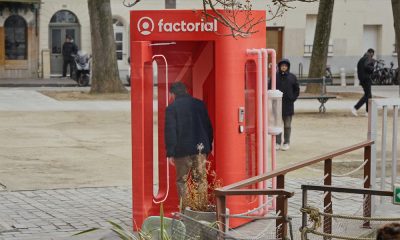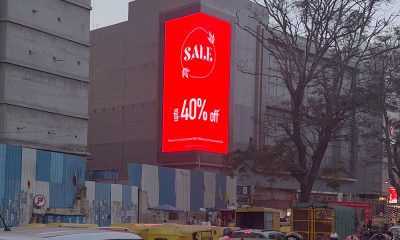OOH News
JCDecaux publishes the results of a study that measures the socio-economic footprint of its activities worldwide
True to its mission to sustainably improve the quality of life for all citizens through proximity and mobility, JCDecaux sought to accurately measure its contribution to the economic and social development of its operating environments by conducting an independent study using concrete and audited data.

JCDecaux SE has published the results of a study that measures its socio-economic footprint worldwide and in France. Conducted by the agency Utopies, it extends a pilot study carried out in 2019 on the French territory. The details of the study are available on the company’s website.
Since 1964, JCDecaux has championed its virtuous model to design, install and maintain infrastructure (bus shelters, self-cleaning public toilets, self-service bikes, etc.) in public spaces and transport areas, with their useful and innovative services, financed by brand communication.
True to its mission to sustainably improve the quality of life for all citizens through proximity and mobility, JCDecaux sought to accurately measure its contribution to the economic and social development of its operating environments by conducting an independent study using concrete and audited data.
Present in more than 80 countries and with over 11,000 employees worldwide, JCDecaux commissioned the French agency Utopies to assess the contribution of its model, products, services and business lines on a global scale.
JCDecaux, a sustainable media with a business model that is virtuous in three ways
Socially, the study illustrates JCDecaux’s significant contribution to supporting job creation and protection, both worldwide and in France.
Conducted on an unprecedented global scale, the Utopies study demonstrates JCDecaux’s positive socioeconomic footprint in all its operating locations: in 2022, the Group’s business activities supported almost 120,000 jobs around the world (41% of this figure in Europe).
For each direct job created by JCDecaux, 9.7 additional jobs are supported in the global economy.
In France, JCDecaux’s business activities supported nearly 14,700 jobs on the national territory in 2022, including more than 3,100 direct jobs. More than 3,200 indirect jobs have also been supported in JCDecaux’s French value chain, represented by 1,700 suppliers including 70% VSEs and SMEs. For each job created by JCDecaux, 3.6 additional jobs are supported in the national economy.
Economically, JCDecaux Group shares nearly 50% of the resources it develops to finance living spaces and transport facilities (value redistributed to cities, transport companies, airports, shopping centres and private landlords, as well as States and local communities). Through its investments, innovations, street furniture and communication systems that provides useful information to citizens, consumers and users, JCDecaux contributes towards developing and boosting local areas without burdening public finances.
Environmentally, JCDecaux’s three key activities – namely, bus shelters, land transport and self-service bikes – meet the challenge of climate change mitigation by promoting sustainable mobility across the globe. For this reason, nearly 50% of the Group’s revenue is now aligned with the European Green Taxonomy.
JCDecaux, a responsible and committed player
Since the company’s foundation in 1964, JCDecaux has been strongly committed to a sustainable business model, that respects the environment and is also socially responsible. In June 2023, the Company unveiled its new Climate Strategy, “committed SBTi”, including targets to continue reducing its carbon footprint across its entire value chain. Based on three principles – Measure, Reduce and Contribute beyond the Group’s value chain –, the strategy aims for Net Zero Carbon by 2050 (scopes 1, 2 and 3). It serves to complement the Company’s ambitious 2030 ESG Strategy.
JCDecaux’s long-term expanded commitment to the environment and the public interest, has come to the fore at a time when, all over the world, public procurement with its new criteria for sustainability is accelerating both the ecological transition and the economic rebound. The recent evolution of legislation in France – Climate and Resilience Law, new Public Procurement Code, Green Industry Law – makes it possible to progress towards more responsible public procurement.
JCDecaux’s ESG performance is recognised by global-leading extra-financial rating agencies such as CDP, with the Group reaching Leadership level and securing a place on its A list. Day in, day out, whether in public spaces, transport or retail areas, JCDecaux highlights its determination to respond to the challenges of climate change, making outdoor advertising into a media that accelerates the ecological transition and street furniture a driver of regional transformation. This commitment is central to the Company’s partnership with the United Nations Joint Sustainable Development Goals Fund (Joint SDG Fund) signed in January 2023, which seeks to mobilise public and private stakeholders in their initiatives for human progress that is at once economic, environmental and societal.
Jean-François Decaux, Chairman of the Executive Board and Co-CEO of JCDecaux, said: “Since our company was founded, JCDecaux has adopted a responsible approach, placing sustainable development at the heart of its company strategy. Through our products and services, and culture of innovation, we are transforming the company from an ecological, economic and social standpoint, and the same ambition applies to our stakeholders and supply partners.
“The ecological and social transition will accelerate the potential for innovation, growth and employment, by activating the decisive lever of sustainable public procurement – following the example of the advances contained in the recent French Climate & Resilience and Green Industry laws. In France and in the world and for the economy as a whole, extra-financial criteria, whether social or environmental, must be more systematically evaluated in public procurement so that, in a qualitative approach, the value of a product or service is not reduced to price alone. By renewing this study to measure our socioeconomic footprint, we are reiterating our commitment to transparency and further demonstrating our contribution to the development of services for cities and transport partners that benefit citizens and stakeholders everywhere we operate. The results of this latest study underline the utility and public service provided by JCDecaux worldwide and in France. We can take pride in this performance which recognises both the vision of our founder 60 years ago and the work undertaken by our teams across 80 countries. Utopies’ report demonstrates the value of our public utility, spurring us on to develop even more solutions working with our partners, ensuring sustainable and inclusive development that benefits everyone, everywhere.”
Study methodology
Conducted in 2023 on the basis of 2022 data, the Utopies study takes into account most of the economic flows generated by JCDecaux (payroll, purchases and taxation). The assessed footprint is reflected in indicators such as jobs supported and includes the direct impacts (employees and added value) of JCDecaux, indirect impacts related to its supplier chain and impacts resulting from paid salaries and taxes (via household consumption and the expenditure of public authorities).
























